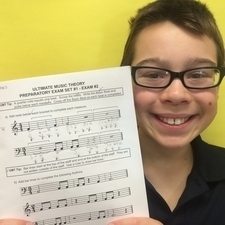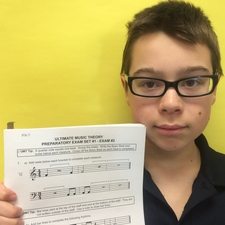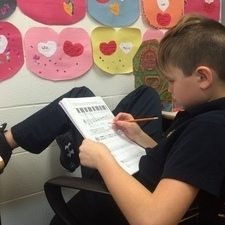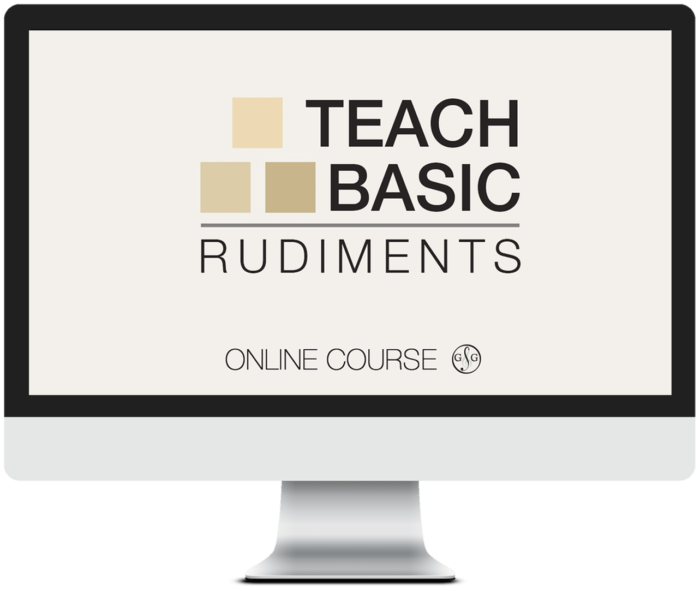Why Show Your Work

Why Show Your Work?
When I teach theory, I tell my students to "Show Your Work"! This means that they:
- Write in the Memory Joggers (like the M for Melodic Intervals and the H for Harmonic Intervals)
- Write in all Scoops, Basic Beats and Pulses (for all Rhythm, Rests and Time Signature Questions)
- Write out their Circle of Fifths (for all Key Signature, Intervals and Transposition Questions)
Here are 3 Reasons why it is important for students to show their work when they are completing their theory:
Why Show Your Work? Reason 1 - It's Easier
When adding rests, if you write in the Scoops, Basic Beat and Pulse, it is simply easier to discover the correct answer. These teaching tools are designed for students to arrive at the correct answer in an easy, step-by-step method.
 When students try to skip these steps and do the thinking "in their head" instead of "on their paper", mistakes often happen. Why? Simple reason - our brains can't see the work when we do it in our heads.
When students try to skip these steps and do the thinking "in their head" instead of "on their paper", mistakes often happen. Why? Simple reason - our brains can't see the work when we do it in our heads.
When we show our work on the paper, our brain can see the work and errors are avoided. When we try to do all the work "in our head", we often miss something important because we can't "see" our work.
My student Alexander decided to argue that since he understood Basic Beat, Rests and Pulses, he didn't have to show his work. So, he completed question #7 in the Preparatory Exam Set #1 - Exam #2 without showing his work.
Take a look at his answer. How many boo-boos do you see?
Why Show Your Work? Reason 2 - Double Checking
When you show your work, it means that you are double checking (or proving) your answer.
 I did not tell Alexander which rests he had written incorrectly. I gave him my "mean teacher look" and told him to do it again but this time to show his work.
I did not tell Alexander which rests he had written incorrectly. I gave him my "mean teacher look" and told him to do it again but this time to show his work.
Can you guess what happened when Alexander erased his answers and completed the question showing his work?
That's right - he fixed all his errors and he handed me his Exam Book with a smile of confidence on his face.
Did you notice... not only had Alexander showed his work, he checked off each part of the question as he completed it.
Why Show Your Work? Reason 3 - It Saves Time
Yes, it actually saves time to write out your steps when completing your questions. It is easier to double check. It is easier to "see" if you have made a mistake.
Working everything through "in our heads" actually will take significantly longer to do, especially when you go back to "triple check" before handing in your examination!
I explain to my students that when I am marking their work, it saves ME time when they show their work. I can't see inside their head to figure out how they got their answer. When they show their work, I can see their thought process. If they are struggling with a step, it makes it easier for me to see what area we need to review.
Can You Show Your Work on Exams?
I am often asked if it is okay for students to "show their work" when completing their Nationally Recognized Theory Examination, such as the Royal Conservatory of Music Theory Examination.
The answer is - YES! It is absolutely OK for students to show their work. What is marked is the answer that is in the "answer spot" on the examination, not the "student notes" written around it.
Do not erase your work either. I've had several Examiners comment that they know when a student has prepared for their Theory Exam using Ultimate Music Theory Workbooks as it is so easy to mark their examinations! By showing their work, the student has completed the work carefully and the answers are lined up properly in the questions!
Bonus Tip...
When preparing students for their Theory Examination, have them practice writing out their "Study Notes" on a separate piece of paper before they even open their Exam Pages.
Every RCM Theory Exam has a page at the end with a staff on it. This page can be detached from the exam and used by the student to make notes.
Inside the front cover of each Ultimate Music Theory Workbook is a Guide. Inside the back cover is a Chart. Have your students practice recreating these on their extra page before they begin writing each practice exam.
I like to have my students also use the staff lines to write out their Key Signatures (just in case they have a brain burp due to nerves and they forget what lines or spaces the sharps and flats go on!).
Every Memory Jogger needed for successful completion of their Exam is in the Guide and Chart!
Don't Forget to Read the Instructions!
 PS - Funny Story. Alexander was sharing a 2 hour lesson time with his brother Jaydon. (They usually have separate hour lessons, but the weather was yucky and both boys just came together.)
PS - Funny Story. Alexander was sharing a 2 hour lesson time with his brother Jaydon. (They usually have separate hour lessons, but the weather was yucky and both boys just came together.)
Jaydon was working on extra theory pages in his Ultimate Music Theory Prep 2 Workbook and kept marveling at how the notes were all the same keys on the keyboard. After the 3rd "oh wow, it is the same key!", I asked him to read the instructions aloud to me.
Here is what the instruction (Page 48 #4a) said - "Write the names of the enharmonic equivalent notes in each measure." Yup, I hated to ruin his fun, but they were all enharmonic equivalents.
Moral of this story - reading instructions is very important!
Ultimate Music Theory Practice Exams
The Ultimate Music Theory Practice Exams make it easy for students to prepare for their theory examinations.
BONUS - the Exam Answer Books make it easy for Teachers to mark these exams as all answers are written in by hand and match each Practice Exam book!
When you buy the Teacher Exam Pack, you get one copy of each of the 8 Exam Books and a copy of each of the 8 Exam Answer Books.
There are 2 Exam Books (and matching Answer Books) for each of the 4 Theory Examination Levels.
These Exam Books are available as hard-copies (printed books) and as downloadable books (you print them off).
Remember Students... Show Your Work!
- Preparatory Rudiments Theory Exams
- Basic Rudiments Theory Exams
- Intermediate Rudiments Theory Exams
- Advanced Rudiments Theory Exams
Do not hesitate to contact us if you have any questions as you prepare your students for their Exams. We are here to help!

The FREE Tips to Teach Basic Rudiments Online Mini-Course is a FREE Teacher Training Course. Each of the 12 Videos highlights one music theory concept from each of the 12 Lessons in the Basic Rudiments Workbook.
This Mini-Course contains quick Teaching Tips to Supercharge Your Class!
To help you even more we've created FREE RESOURCES for you to use as learning tools and building blocks in your musical adventure.
Keep on Learning... With a Smile and a Song!
Shelagh McKibbon-U'Ren

